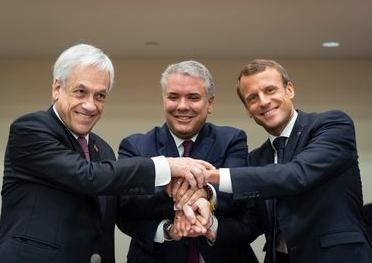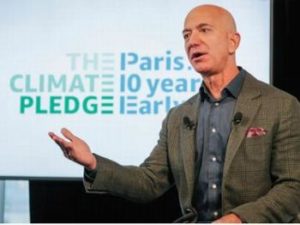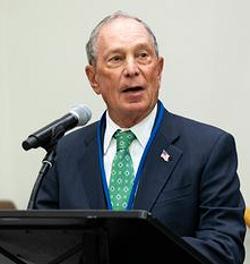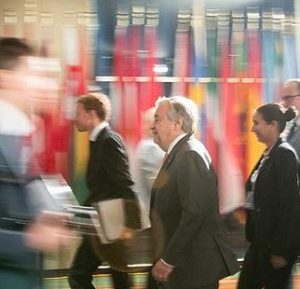Climate Action Summit Yields Trillions in Funding

Sebastián Piñera Echeñique (left), President of the Republic of Chile; Iván Duque Márquez (center), President of the Republic of Colombia; and Emmanuel Macron, President of the Republic of France, pose for a photo at the Alliance for Rainforests event held in conjunction with the Climate Action Summit. September 23, 2019 New York, New York (Photo by Rick Bajornas / United Nations) Posted for media use
By Sunny Lewis
NEW YORK, New York, September 24, 2019 (Maximpact.com News) – UN Secretary-General Antonio Guterres warned world leaders not to come to his landmark Climate Action Summit with beautiful speeches alone, but to present plans for cutting greenhouse gas emissions and strategies for carbon neutrality by 2050. So what was promised at Monday’s event at UN Headquarters in New York?
The private sector showed how it can bring about real positive change, when 87 major companies – with a combined market capitalization of over US$2.3 trillion, over 4.2 million employees, and annual direct emissions equivalent to 73 coal-fired power plants – committed to setting climate targets across their operations.
These businesses include well-known brands such as Burberry, Danone, Ericsson, Electrolux, IKEA, and Nestlé.
A number of these companies (you can find the full list here), went a step further, by committing to “science-based targets,” which means that their corporate emissions cuts can be independently assessed.
Speaking at the UN Global Compact Private Sector Forum, Anand Mahindra, chairman of the Mahindra Group, an Indian multinational conglomerate with over 200,000 employees, said that more and more business leaders are waking up to the fact that sustainability and profit go together, and that climate action represents the biggest business opportunity of the next few decades.
In the finance sector, some of the world’s largest pension funds and insurers, responsible for directing more than $2 trillion in investments, have joined together to form the Asset Owner Alliance, which committed to moving their portfolios to carbon-neutral investments by 2050. The members of the Alliance are already engaging with companies in which they are investing, to ensure that they are decarbonizing their business models.
One-third of the global banking sector, 130 banks, signed up to align their businesses with the Paris Agreement goals.
The Bill and Melinda Gates Foundation, the World Bank, and several governments announced financial commitments of US$790 million and assistance to enhance resilience of over 300 million small-scale food producers in the face of mounting climate impacts.
The money will go to the CGIAR, formerly called the Consultative Group on International Agricultural Research, a global partnership that unites international organizations engaged in research for a food-secured future. CGIAR research is dedicated to reducing rural poverty, increasing food security, improving human health and nutrition, and ensuring sustainable management of natural resources.
Bill Gates, co-chair of the Bill and Melinda Gates Foundation and the Global Commission on Adaptation, announced the financial commitments on the main stage of the UN Climate Action Summit. He was joined on stage by Egyptian President Abdel Fattah Al Sissi, Bangladesh Prime Minister Sheikh Hasina, Ghanaian President Addo Dankwa Akufo-Addo, and World Bank Group President David Malpass.
“Most people have never heard of it, but CGIAR has done more to feed the world’s poorest people than any other organization on earth,” said Gates, co-chair of the Bill & Melinda Gates Foundation and co-chair of the Global Commission on Adaptation. “Ultimately we need to double funding for CGIAR research to fully equip this unique and valuable institution to confront a wide range of climate challenges.”
Ban Ki-moon, 8th secretary-general of the United Nations and co-chair of the Global Commission on Adaptation said, “Without urgent action to help the world’s smallholder farmers, we risk undermining our food security for generations to come. Today’s financial commitments are a positive step forward, but more must be done to ensure the world’s farmers are equipped for long-term sustainable, climate-smart production.”
Amazon and Global Optimism announced The Climate Pledge, a commitment to meet the Paris Agreement 10 years early. Amazon is the first signatory of this pledge. The Climate Pledge calls on signatories to be net zero carbon across their businesses by 2040, a decade ahead of the Paris Accord’s goal of 2050.

Amazon founder and CEO Jeff Bezos promises to fight climate change with US$100 million for tree planting and cuts to the company’s emissions. September 19, 2019 (Photo courtesy Amazon)
“We’re done being in the middle of the herd on this issue. We’ve decided to use our size and scale to make a difference,” said Jeff Bezos, Amazon founder and CEO. “If a company with as much physical infrastructure as Amazon, which delivers more than 10 billion items a year, can meet the Paris Agreement 10 years early, then any company can.”
“I’ve been talking with other CEOs of global companies, and I’m finding a lot of interest in joining the pledge,” said Bezos. “Large companies signing The Climate Pledge will send an important signal to the market that it’s time to invest in the products and services the signatories will need to meet their commitments.”
Global Optimism, co-founded by former UNFCCC chief Christiana Figueres, is focused on social and environmental change. “Bold steps by big companies will make a huge difference in the development of new technologies and industries to support a low carbon economy,” she said at The Climate Pledge announcement.
Amazon also announced the launch of the Right Now Climate Fund, committing US$100 million to restore and protect forests, wetlands, and peatlands around the world in partnership with The Nature Conservancy.
Why Climate Action Summit Pledges Are Necessary
The world’s leading climate science organizations joined forces in a landmark new report for the UN Climate Action Summit, underlining the glaring and growing gap between agreed targets to tackle global warming and the actual reality. The synthesis report was compiled by the World Meteorological Organization.
They report that levels of the main long-lived greenhouse gases, carbon dioxide (CO2), methane (CH4)) and nitrous oxide (N2O) have reached new record-high levels.
Carbon dioxide emissions grew two percent and reached a record high of 37 billion tonnes of CO2 in 2018. There is still no sign of a peak in global emissions, even though they are growing slower than the global economy.
Current economic and energy trends suggest that emissions will be at least as high in 2019 as they were in 2018.
The last four years were the four hottest on record, and winter temperatures in the Arctic have risen by 3°Celsius since 1990. Sea levels are rising, coral reefs are dying, and we are starting to see the life-threatening impact of climate change on health, through air pollution, heatwaves and risks to food security.
In this, the warmest five-year period on record, the average global temperature for 2015–2019 is currently estimated to be 1.1°Celsius (± 0.1°C) above pre-industrial (1850–1900) times. Widespread and long-lasting heatwaves, record-breaking fires and other devastating events such as tropical cyclones, floods and drought have had major impacts on socio-economic development and the environment.
Arctic summer sea-ice extent has declined at a rate of approximately 12 percent per decade during 1979-2018. The four lowest values for winter sea-ice extent occurred between 2015 and 2019. Overall, the amount of ice lost annually from the Antarctic ice sheet increased at least six-fold between 1979 and 2017. Glacier mass loss for 2015-2019 is the highest for any five-year period on record.
Sea-level rise is accelerating, and sea water is becoming more acidic. This is due to the increased rate of ocean warming and melting of the Greenland and West Antarctica ice sheets. There has been an overall increase of 26 percent in ocean acidity since the beginning of the industrial era.
Governments Pledge Funding, Emissions Cuts, Tree Planting
Among the major announcements at the Climate Action Summit:
- France announced that it would not enter into any trade agreement with countries that have policies counter to the Paris Agreement.
- Germany committed to carbon neutrality by 2050
- 12 countries today made financial commitments to the Green Climate Fund, the official financial mechanism to assist developing countries in adaptation and mitigation practices to counter climate change. This is in addition to recent announcements from Norway, Germany, France and the United Kingdom who have recently doubled their present contributions.
- The United Kingdom today made a major additional contribution, doubling its overall international climate finance to 11.6 billion pounds for the period from 2020 to 2025
- India pledged to increase renewable energy capacity to 175gw by 2022 and committed to further increasing to 450GW, and announced that 80 countries have joined the International Solar Alliance.
- China said it would cut emissions by over 12 billion tons annually, and would pursue a path of high quality growth and low carbon development.
- The European Union announced at least 25 percent of the next EU budget will be devoted to climate-related activities.
- The Russian Federation announced that it will ratify the Paris Agreement, bringing the total number of countries that have joined the Agreement to 187.
- Pakistan said it would plant more than 10 billion trees over the next five years.
Transitioning Energy From Brown to Green
- Michael Bloomberg will increase the funding and geographic spread of his coal phase-out efforts to 30 countries. Already, his work has helped to close 297 out of 530 coal

Michael Bloomberg, Special Envoy of the Secretary-General for Climate Action, speaks at a special event titled Alliance for Rainforests that took place in tandem with the UN Climate Action Summit. September 23, 2019 New York, New York (Photo by Rick Bajornas / United Nations) Posted for media use
plants in the United States.
- Countries, including France and New Zealand, announced that they will not allow oil or gas exploration on their lands or in their off-shore waters.
- Heads of State from Finland, Germany, Greece, Hungary, Ireland, Italy, Netherlands, Portugal, and Slovakia, are among those that announced that they will work to phase out coal. Then South Korea announced it would shut down four coal-fired power plants, and six more will be closed by 2022, as well as the doubling of its contribution to the Green Climate Fund.
- Many countries announced new contributions to the Green Climate Fund, the official financial mechanism to assist developing countries in adaptation and mitigation practices to counter climate change, with several countries, including France, Germany, Norway and the United Kingdom, announcing that they would double their present contributions.
- The Summit also delivered critical platforms for improving energy efficiency and reducing the growing energy needs for cooling, with the “Three Percent Club” coalition working to drive a three percent annual global increase in energy efficiency. The Cool Coalition set ambitious national cooling targets for its members with the potential to deliver up to one degree on the pathway to a 2050 net zero carbon world.
Scaling Up Financing, Unlocking Funding Barriers
- The Climate Investment Platform was officially announced. It will seek to directly mobilize US$1 trillion in clean energy investment by 2025 in 20 Least Developed Countries in its first year.
“The Climate Investment Platform is a crucial initiative that will simplify access to climate finance. It will catalyze investment for mitigation and adaptation in developing countries, supporting those most in need of climate action,” said Green Climate Fund Executive Director Yannick Glemarec.
- Summit initiatives were designed to ensure the actions undertaken would be fair for all, supporting jobs and clear air for better health, and protect the most vulnerable, as well as new initiatives on adaptation, agriculture and early warning systems that will protect 500 million additional people against the impacts of climate change.
Unlocking the Power of Nature

The US$150 million agreement announced at the Climate Action Summit between Gabon and Norway via the Central African forest initiative is historic. For the first time, an African country will be rewarded in a 10-year deal for reducing its greenhouse gas emissions from deforestation and degradation, and absorptions of carbon dioxide by natural forests. (Photo courtesy Central African Forest Initiative) Posted for media use
Using the power of nature is believed to be one of the most effective and immediate ways to address the climate crisis. Strengthening natural ecosystems such as forests is one such solution. More forests means more capacity for carbon capture, and replanting mangrove forests provides an effective, inexpensive natural barrier against coastal floods and shoreline erosion.
Dr. Thani bin Ahmed Al Zeyoudi, Minister of Climate Change and Environment for the United Arab Emirates, said, “We must open our eyes to the cruel fact that climate change is progressing faster than we are, and we need to pick up the pace to win this fight. We realize the gravity of the task at hand, but are confident that together we can build the necessary global momentum to save the natural world we value and on which we depend so much.”
The Climate Action Summit saw the launch of several initiatives designed to access nature-based solutions. These include:
- the Global Campaign for Nature, which plans to conserve around 30 percent of the Earth’s lands and oceans by 2030 with an investment of US$1 billion.
- a High-Level Panel for the Sustainable Ocean Economy, comprised of heads of state and government from Australia. Canada, Chile, Fiji, Ghana, Indonesia, Jamaica, Japan, Kenya, Mexico, Namibia, Norway, Palau and Portugal, which will build resilience for the ocean and marine-protected areas;
- and the Central African Forest Initiative<> to protect the region’s forest cover, which provides livelihoods for some 60 million people.
A US$150 million agreement was announced between Gabon and Norway through the Central African Forest Initiative. For the first time, an African country will be rewarded in a 10-year deal for both reducing its greenhouse gas emissions from deforestation and degradation, and absorptions of carbon dioxide by natural forests. The partnership provides Gabon with a major incentive for cutting greenhouse gases by setting a carbon price floor at US$10 per certified ton.
Gabon has preserved the majority of its pristine rainforest since the early 2000s in creating 13 national parks, one of which is listed as UNECO’s Natural Heritage. The country has made significant advances in sustainable management of its timber resources outside the parks. While it only has 12 percent of the Congo Basin forests, Gabon hosts almost 60 percent of the surviving forest elephants in Africa, a key indicator of sound natural resource governance.
“I am very pleased with this results-based partnership through CAFI, which includes a historic carbon floor price to further encourage Gabon to continue to preserve its rainforest,” said Ola Elvestuen, Norway’s Minister of Climate and Environment. “Gabon is 88 percent covered with forests, and I hope our partnership can help them reach their goal to maintain 98% of that for the future,” he said.
Cleaning Up Cities
It is now possible to construct buildings that are 100 percent net-zero carbon emitters, and the Zero Carbon Buildings for All initiative, a multi-partner global initiative endorsed by

A retrofit of this 26-storey office tower, constructed in 1985, included architectural, mechanical and electrical upgrades, transforming it into a modern and energy efficient building. Formerly occupied by Export Development Canada, the building is now mostly occupied by Canadian tech firm Shopify. July 31, 2019 (Photo by Joanne Clifford)
the UN Secretary General, is pledging to make all buildings, both new and existing, net zero carbon by 2050. This could potentially lead to a US$1 trillion investment in developing countries by 2030.
All buildings must be net-zero carbon by 2050 to meet the goals of the Paris Agreement, but fewer than one percent of buildings are today.
Led by the nonprofit World Resources Institute and the World Green Building Council, Zero Carbon Buildings for All is supported by partners across civil society, national governments, and the private sector.
“When it comes to climate change, we need to shift from ‘doing better’ to ‘doing enough,’” said Andrew Steer, president and CEO of the U.S.-based World Resources Institute. “This requires reducing emissions to net zero by 2050. Decarbonizing buildings is absolutely essential to attaining that.”
Buildings operations account for 28 percent of energy-related CO2 emissions, making them among the largest contributors to climate change. The good news is that improving buildings is also one of the most proven, cost-effective climate mitigation solutions available. Improved buildings often feature the latest in architectural design and enhance the quality of life, health and productivity of people living and working in them.
Zero Carbon Buildings for All will leverage the leadership of government, industry and civil society to both secure commitments to ambitious targets (national policy roadmaps to decarbonize new buildings by 2030 and existing buildings by 2050) and mobilize significant funding (at least $1 trillion in Paris Agreement-compliant buildings investment in developing countries by 2030).
The national governments announcing their commitment to Zero Carbon Buildings for All include a cross-section of developing and industrialized countries: Kenya, Turkey, the United Arab Emirates, and the United Kingdom.
A total of 2,000 cities committed to placing climate risk at the center of their decision-making, planning and investments. This includes launching 1,000 bankable, climate-smart urban projects, and creating innovative financing mechanisms.
Tackling traffic congestion and pollution is the aim of the Action Towards Climate Friendly Transport initiative, which includes actions to plan city development in a way that minimises travel, shift from fossil-fuelled vehicles to non-motorized and public transport, and increase the use of zero-emission technologies.
Next: The First Sustainable Development Goals Summit

Caption: UN Secretary-General Antonio Guterres (center) strides through UN Headquarters in New York on his way to the opening of his Climate Action Summit, September 23, 2019 (Photo by Ariana Lindquist / United Nations) Posted for media use
“We need more investment, more political action, more priority for a fair globalization”, Secretary-General Guterres told reporters, when asked about his expectations for the first-ever Sustainable Development Goals (SDG) Summit, September 24-25 at New York headquarters.
Guterres emphasized that, with just over 10 years to go, the world is not on track to hit targets related to sustainable development, and urged world leaders to “take the decisions necessary, in order to come together more effectively to make sure that the 2030 Agenda is successfully implemented.”
The SDG Summit is one of the five important high-level summits and meetings talking place during the opening week of the latest session of the UN General Assembly. It is intended to allow leaders from government, business and other sectors to identify specific actions that can help get the SDG response back on track, with a decade of action and delivery still in play, in the lead up to the 2030 deadline.
The format will break down the topics into six dialogues, pairing a leader of a developing country, with the head of a developed country as co-moderators.
The themes of each dialogue are megatrends, accelerating the SDGs, measures to leverage progress, localizing the SDGs, partnerships for sustainable development, and the 2020-2030 vision.
The SDG Summit is expected to conclude with a political declaration by heads of state and government that provides political guidance how to step up the pace of implementation of the 2030 Agenda and SDGs, and a series of SDG acceleration actions.
A full list of the many initiatives announced during the UN Climate Action Summit can be found here.